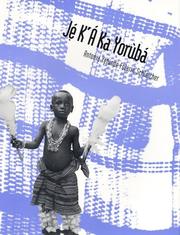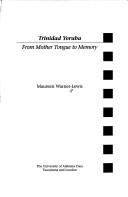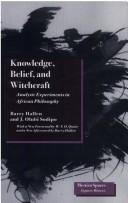| Listing 1 - 10 of 10 |
Sort by
|
Book
ISBN: 9155428681 9789155428686 Year: 1992 Volume: 77 Publisher: Stockholm: Almqvist och Wiksell,
Abstract | Keywords | Export | Availability | Bookmark
 Loading...
Loading...Choose an application
- Reference Manager
- EndNote
- RefWorks (Direct export to RefWorks)
Krio language --- Congresses --- -Aku language (Creole) --- Creole dialects, English --- Congresses. --- -Congresses --- Aku language (Creole) --- Langues créoles anglaises --- Langues créoles --- Krio language - Congresses
Book
ISBN: 9785420892 9789785420890 9789785416459 9785416453 Year: 2017 Publisher: Baltimore, Maryland : Baltimore, Md. : Project Muse, Project MUSE,
Abstract | Keywords | Export | Availability | Bookmark
 Loading...
Loading...Choose an application
- Reference Manager
- EndNote
- RefWorks (Direct export to RefWorks)
The Landmarks Series is a research and publications outfit funded by the Landmarks Research Foundation to publish recent outstanding doctoral dissertations on any aspect of Nigerian linguistics, languages, literatures and cultures. This study is a departer from most previous work on Yor{grave}ub{acute}a Grammar in the sense that rather than being purely a descriptive grammar; it attempts to provide a theoretical analysis of the internal and external syntax of Yor{grave}ub{acute}a nominal expressions using the Chomskyan Principles and Parameters approach to syntax. This Generative theory attempts to characterize the grammar of all natural languages in terms of a set of universal principles that all languages share, and a set of parameters along which languages may vary. The book emphasizes the empirical motivation behind major theoretical proposals in that framework, and shows how views on the nature of universal grammar and cross-linguistic variation have developed over the years as a consequence of a massive increase in cross-linguistic syntactic research.
Yoruba language --- Aku language --- Eyo language --- Nago language --- Yariba language --- Kwa languages --- Syntax. --- Possessives. --- Noun phrase. --- Nominals.
Book
ISBN: 0340176571 Year: 1981 Publisher: London Hodder and Stoughton
Abstract | Keywords | Export | Availability | Bookmark
 Loading...
Loading...Choose an application
- Reference Manager
- EndNote
- RefWorks (Direct export to RefWorks)
Yoruba language --- Yoruba-Sprache. --- Yoruba language. --- Dictionaries --- English. --- Aku language --- Eyo language --- Nago language --- Yariba language --- Kwa languages --- Dictionaries&delete& --- English

ISBN: 0300071450 Year: 1998 Publisher: New Haven (Conn.) : Yale university press,
Abstract | Keywords | Export | Availability | Bookmark
 Loading...
Loading...Choose an application
- Reference Manager
- EndNote
- RefWorks (Direct export to RefWorks)
Yoruba language --- Textbooks for foreign speakers --- English. --- Aku language --- Eyo language --- Nago language --- Yariba language --- Kwa languages --- Textbooks for foreign speakers&delete& --- English

ISBN: 0817383182 9780817383183 9780817355821 0817355820 0817307273 9780817307271 Year: 1996 Publisher: Tuscaloosa University of Alabama Press
Abstract | Keywords | Export | Availability | Bookmark
 Loading...
Loading...Choose an application
- Reference Manager
- EndNote
- RefWorks (Direct export to RefWorks)
A deeply informed Afrocentric view of language and cultural retention under slavery. Maureen Warner-Lewis offers a comprehensive description of the West African language of Yoruba as it has been used on the island of Trinidad in the southern Caribbean. The study breaks new ground in addressing the experience of Africans in one locale of the Africa Diaspora and examines the nature of their social and linguistic heritage as it was successively retained, modified, and discarded in a European-dominated island community.
Yoruba language --- Aku language --- Eyo language --- Nago language --- Yariba language --- Kwa languages --- Dialects --- Ethnohistory --- Ethnohistorical method --- Historical anthropology --- Historical ethnology --- Anthropology --- Ethnology --- Methodology
Book
ISBN: 1283856786 1614510458 9781614510451 1614510431 9781614510437 Year: 2012 Volume: 47 Publisher: Berlin Boston
Abstract | Keywords | Export | Availability | Bookmark
 Loading...
Loading...Choose an application
- Reference Manager
- EndNote
- RefWorks (Direct export to RefWorks)
This is the first comprehensive account of prolonged hearing loss and its impact on a language that was once spoken fluently. Although it is currently assumed that hearing loss results in speech deterioration, it is shown that language loss occurs when speakers remain deaf for a long time. The reader is introduced to a significant deaf population - postlingually deafened Yoruba speakers who have been deaf for more than twenty years and who have no access to hearing aids or speech therapy. After becoming deaf, they continue to speak Yoruba from memory and "hear" visually through lip reading. These speakers exhibit phonological, lexical and syntactic losses which mirror acquisition patterns attested in the speech of Yoruba children. Based on these similarities, it is argued that a direct link exists between language loss and first language acquisition. It is further argued that prolonged deafness results in language reversal. Finally, the book presents the first description of the sign language and gestures used by deafened speakers to augment their spoken language. These findings will be of value to linguists, speech, language and hearing therapists, anthropologists, Africanists, deaf studies researchers, and non-specialists who are interested in hearing health and wellness.
Postlingual deafness --- Yoruba language --- Acquired deafness, Postlingually --- Postlingually acquired deafness --- Deafness --- Aku language --- Eyo language --- Nago language --- Yariba language --- Kwa languages --- Patients --- Rehabilitation --- Phonology. --- Deaf Communities. --- Language Acquisition. --- Language Attrition. --- Sign Languages. --- Yoruba.
Book
ISBN: 131601116X 1316013405 1316002160 1316006662 1316008908 1316004406 1107239079 1107047447 110766392X 1139990551 9781107239074 9781316004401 9781316006665 9781107047440 Year: 2014 Publisher: Cambridge : Cambridge University Press,
Abstract | Keywords | Export | Availability | Bookmark
 Loading...
Loading...Choose an application
- Reference Manager
- EndNote
- RefWorks (Direct export to RefWorks)
The Yoruba was one of the most important civilizations of sub-Saharan Africa. While the high quality and range of its artistic and material production have long been recognized, the art of the Yoruba has been judged primarily according to the standards and principles of Western aesthetics. In this book, which merges the methods of art history, archaeology, and anthropology, Rowland Abiodun offers new insights into Yoruba art and material culture by examining them within the context of the civilization's cultural norms and values and, above all, the Yoruba language. Abiodun draws on his fluency and prodigious knowledge of Yoruba culture and language to dramatically enrich our understanding of Yoruba civilization and its arts. The book includes a companion website with audio clips of the Yoruba language, helping the reader better grasp the integral connection between art and language in Yoruba culture.
Art, Yoruba. --- Yoruba language. --- Philosophy, Yoruba. --- Language and languages in art. --- Philosophy, Yoruba (African people) --- Yoruba philosophy --- Aku language --- Eyo language --- Nago language --- Yariba language --- Kwa languages --- Art, Yoruba (African people) --- Yoruba art
Book
ISBN: 0511702612 1108020992 Year: 2011 Publisher: Cambridge : Cambridge University Press,
Abstract | Keywords | Export | Availability | Bookmark
 Loading...
Loading...Choose an application
- Reference Manager
- EndNote
- RefWorks (Direct export to RefWorks)
Samuel Johnson was an Anglican minister & historian renowned for his magisterial history of the Yoruba people. Born in Freetown in Sierra Leone & educated by the Church Missionary Society, Johnson was sent with his family to Idaban in Nigeria in 1857. He was ordained in 1880 & by 1897 had finished the manuscript for The History of the Yorubas. However the original publisher mysteriously misplaced the manuscript. After Johnson's death his brother, Dr Obadiah Johnson, recompiled the text from Samuel's notes. This volume, first published in 1921, contains that reconstructed edition. This pioneering volume brought together various oral & recorded accounts of Yoruba history, describing not only political history but also social customs, language & laws. Although recent analysis of the text has revealed some inaccuracies, this volume remains the standard reference for the history of the Yoruba people.
Yoruba (African people) --- Yoruba language. --- History. --- Civilization. --- Social life and customs. --- Aku language --- Eyo language --- Nago language --- Yariba language --- Kwa languages --- Yariba (African people) --- Yooba (African people) --- Yorubas --- Ethnology

ISBN: 0804728232 Year: 1997 Volume: *1 Publisher: Stanford, Calif. Stanford University Press
Abstract | Keywords | Export | Availability | Bookmark
 Loading...
Loading...Choose an application
- Reference Manager
- EndNote
- RefWorks (Direct export to RefWorks)
African philosophy --- Afrikaanse filosofie --- Afrikaanse wijsbegeerte --- Belief and doubt --- Connaissance [Théorie de la ] --- Croyance (Philosophie) --- Croyance (Psychologie) --- Croyance et doute --- Doute --- Doute méthodique --- Epistemologie --- Epistemology --- Epistémologie --- Filosofie [Afrikaanse ] --- Filosofie [Joroeba ] --- Geloof en twijfel --- Joroeba filosofie --- Kenleer --- Kennisleer --- Kennistheorie --- Kentheorie --- Knowledge [Theory of ] --- Philosophie africaine --- Philosophie yorouba --- Philosophy [African ] --- Philosophy [Yoruba ] --- Theorie of knowledge --- Theorievorming --- Théorie de la connaissance --- Wijsbegeerte [Afrikaanse ] --- Yoruba philosophy --- Knowledge, Theory of --- Philosophy, African --- Philosophy, Yoruba --- Witchcraft --- Yoruba language --- Theory of knowledge --- Philosophy --- Psychology --- Conviction --- Doubt --- Consciousness --- Credulity --- Emotions --- Religion --- Will --- Agnosticism --- Rationalism --- Skepticism --- Aku language --- Eyo language --- Nago language --- Yariba language --- Kwa languages --- Black art (Witchcraft) --- Sorcery --- Occultism --- Wicca --- Philosophy, Yoruba (African people) --- Semantics --- Nigeria --- Philosophy, Yoruba. --- Yoruba language - Semantics. --- Witchcraft - Nigeria.
Book
ISBN: 1349580511 1137538775 1137521252 Year: 2016 Publisher: New York : Palgrave Macmillan US : Imprint: Palgrave Macmillan,
Abstract | Keywords | Export | Availability | Bookmark
 Loading...
Loading...Choose an application
- Reference Manager
- EndNote
- RefWorks (Direct export to RefWorks)
In this book, Oyěwùmí extends her path-breaking thesis that in Yorùbá society, construction of gender is a colonial development since the culture exhibited no gender divisions in its original form. Taking seriously indigenous modes and categories of knowledge, she applies her finding of a non-gendered ontology to the social institutions of Ifá, motherhood, marriage, family and naming practices. Oyěwùmí insists that contemporary assertions of male dominance must be understood, in part, as the work of local intellectuals who took marching orders from Euro/American mentors and colleagues. In exposing the depth of the coloniality of power, Oyěwùmí challenges us to look at the worlds we inhabit, anew.
Motherhood --- Ifa (Religion) --- Gender identity --- Oyo (African people) --- Family & Marriage --- Sociology & Social History --- Social Sciences --- Yoruba language --- Etymology --- Social aspects. --- Foreign influences. --- Maternity --- Aku language --- Eyo language --- Nago language --- Yariba language --- Culture --- Ethnology --- Sociology. --- Cultural studies. --- Ethnicity. --- Sex (Psychology). --- Gender expression. --- Gender identity. --- Cultural and Media Studies. --- African Culture. --- Gender Studies. --- Cultural and Media Studies, general. --- Ethnicity Studies. --- Cultural Studies. --- Sociology, general. --- Sex identity (Gender identity) --- Sexual identity (Gender identity) --- Identity (Psychology) --- Sex (Psychology) --- Queer theory --- Expression, Gender --- Sex role --- Psychology, Sexual --- Sex --- Sexual behavior, Psychology of --- Sexual psychology --- Sensuality --- Ethnic identity --- Group identity --- Cultural fusion --- Multiculturalism --- Cultural pluralism --- Social theory --- Social sciences --- Cultural studies --- Study and teaching. --- Africa. --- Psychological aspects --- Mothers --- Parenthood --- Kwa languages --- Ethnology-Africa. --- Culture-Study and teaching. --- Ethnology—Africa. --- Culture—Study and teaching. --- Popular culture --- Study and teaching --- Culture. --- Sex. --- Communication. --- Race. --- Media and Communication. --- Race and Ethnicity Studies. --- Physical anthropology --- Communication, Primitive --- Mass communication --- Sociology --- Gender (Sex) --- Human beings --- Human sexuality --- Sex (Gender) --- Sexual behavior --- Sexual practices --- Sexuality --- Sexology --- Cultural sociology --- Sociology of culture --- Civilization --- Social aspects
| Listing 1 - 10 of 10 |
Sort by
|

 Search
Search Feedback
Feedback About UniCat
About UniCat  Help
Help News
News